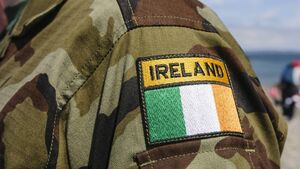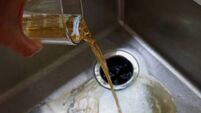Kildare coroner calls for military fitness reforms after soldier took his own life in Curragh Camp

Photo for illustrative purposes only
THE Kildare coroner has called on military fitness to be “decoupled” from career progression within the defence forces because of the fear of personnel speaking out if they were experiencing physical or psychological health problems.
Kildare County Coroner, Loretta Nolan, said she would make such a recommendation to the Minister for Defence, the Department of Defence and the chief-of-staff of the defence forces as it had been “a significant issue for the past 20 years”.
The coroner also called for mental health first aid courses to be available across all ranks and for the defence forces to consider introducing “a buddy system” to allow military personnel to touch base with a confidant on a regular basis about any problems they were having.
Her remarks were made at the conclusion of an inquest into the death of an army corporal who took his own life in the Curragh Camp last year.
The deceased (32) was found in an unresponsive state in the military base’s armoury where he worked in September 2024.
A sitting of Kildare Coroners Court on Wednesday heard that the corporal’s death had come as a shock to his family with his partner telling the inquest that he was “always in good form and never complaining about anything.” An army colleague who was working with the deceased also gave evidence that he had noted nothing out of the ordinary on the day.
CCTV footage of the fatal incident confirmed that no third party was involved in the death.
Dr Nolan told the court that she was dealing with approximately one suicide case every week and was seeking measures by which the issue could be addressed in the broader context of society.
However, the coroner said there was a specific issue with the Defence Forces where she believed military personnel were reluctant to “put their hand up” to say they were suffering some type of illness in case they would not get an extension to their contract or miss out on an overseas tour.
Dr Nolan observed that the occupational health system within An Garda Síochána was much more geared “to keeping people at work.” She claimed there was a constant fear among members of the defence forces of raising any health issue which prevented them from letting people know if they were “in trouble”.
The coroner said there was anecdotal evidence to suggest military staff were less likely to report health issues because it could impact things like going overseas.
Dr Nolan stressed that she was not saying that is what arose in the case of the death that was the subject of the inquest.
She acknowledged that the decoupling of military fitness from career progression was “a big ask” but she maintained it was “a significant issue over the last 20 years”.
The coroner observed that everyone goes through a difficult period at some stage in their life and there was work to be done in finding a suitable way to help somebody who had something hanging over them.
Dr Nolan said she would not make any specific recommendation on how it should be done within the defence forces but it was something that “needs to be looked at”.
The coroner also recommended that the defence forces improve its communications as she was aware of “highly inappropriate” information in the way news of the corporal’s death was disclosed.
Dr Nolan also called for an electoral keypad to be installed for controlling access to cells within the armoury at the Curragh Camp after hearing evidence that staff were using a screwdriver to keep a door locked.
A military officer told the inquest that he was seeking to get a new standing operating procedure signed off, which would require two staff at all times to be involved with any dealing with ammunition.






